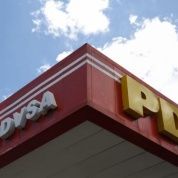This week lawmakers in Caracas are tackling one of the most fiercely debated issues in Venezuelan politics: gasoline prices.

In the U.S., current average gasoline prices of around US$2.42 a gallon are the lowest in nearly two decades, but compared to Venezuela, even that is shockingly high.
Since 1997, Venezuela's government regulated gasoline prices haven't budged from 0.098 bolivars (Bs) a liter. That's less than US$0.02, and easily the cheapest in the world. Across the border, Brazilians pay more than five times more. Meanwhile, in some parts of Colombia, gasoline prices can be as much a 7,000 percent higher.

Gasoline costs less than bottled water, milk or beer. For the cost of a hamburger in Caracas (250Bs), you could hypothetically fill up nearly 200 motorbikes, or 17 small commercial freight trucks. If you ordered a side of fries and a soda with that burger (30Bs for a small soda, and 50Bs for fries), you could line up eight SUVs and another couple of motorbikes behind those freight trucks.

The benefits of the low prices are clear – everyone can afford gasoline, even the poor. For example, Venezuela's monthly minimum wage could buy over 56,000 liters of gasoline. Comparatively, the U.S. minimum wage buys just over US$1600 per month.

However, the generous government subsidies also have drawbacks, such as the high cost on the public purse. Currently, the government spends close to US$20 billion on maintaining its gasoline subsidies every year. While the government foots the bill, many drivers opt for high cost vehicles, such as SUVs – which have been wildly popular in Venezuela since the 1980s. Around 700,000 barrels of oil are consumed by Venezuela's domestic market each day, according to figures from the energy and petroleum ministry. That averages out to roughly eight barrels of oil a year per person. After all, with prices so low, mileage is hardly a major concern. Environmental groups have also argued the gasoline subsidies have contributed to air pollution, pointing to motorists who prefer to leave their car idling rather that switch off the ignition.

So what is the government doing?
Former president Hugo Chavez was critical of the high level of gasoline subsidies, describing prices in 2007 as “obscene.”
Now, President Nicolas Maduro is taking action. Since late 2013 his government has called for a national dialogue on the issue, inviting the National Assembly, business groups, grassroots revolutionaries, environmentalists and with the general public to discuss prices. Maduro and other top government officials have recognized a balancing act needs to be struck to ensure that gasoline prices remain low enough that consumers aren't hurt, but are raised to a fairer price for state oil company, PDVSA. When the national dialogue was first announced in December 2013, Vice President Jorge Arreaza suggested prices would need to rise to at least 0.77Bs for PDVSA to cover production costs.
However, Maduro has stated there is no rush to shake up prices, and a final figure will be the product of comprehensive consultations, to ensure everyone walks away from the negotiating table satisfied.